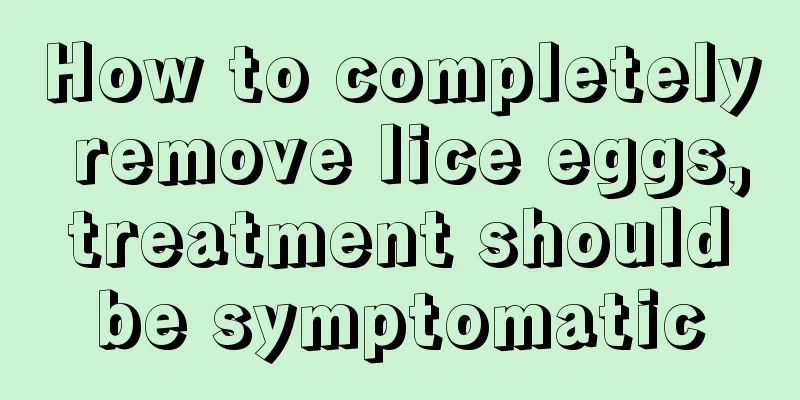It's either constipation or diarrhea, what's going on

|
For those who are either constipated or have diarrhea, they really want to know the reason. So what’s the matter if it’s either constipation or diarrhea? Next, this article will introduce you to the relevant content about what causes constipation or diarrhea, for your reference only. Friends who want to know more about this can continue reading! Please see the detailed introduction below. What’s going on if I’m either constipated or having diarrhea? Either constipation or diarrhea is mainly caused by gastrointestinal dysfunction. Gastrointestinal dysfunction, also known as gastrointestinal neurosis, is a general term for a group of gastrointestinal syndromes. Mental factors are the main cause of the disease. For example, emotional tension, anxiety, difficulties in life and work, worries, unexpected misfortunes, etc. can all affect the normal gastrointestinal function and cause gastrointestinal dysfunction. Gastrointestinal dysfunction usually has a slow onset, and the clinical manifestations are mainly gastrointestinal symptoms. Patients with gastric neurosis often show: acid reflux, belching, anorexia, nausea, vomiting, a burning sensation under the xiphoid process, fullness after eating, upper abdominal discomfort or pain, and the symptoms worsen with every mood change. Enteric neurosis, also known as irritable bowel syndrome, is the most common functional disease of the gastrointestinal tract. The main symptoms are intestinal symptoms. Patients often have abdominal pain, abdominal distension, intestinal rumbling, diarrhea and constipation. When there is pain in the left lower abdomen, a cord-like mass can be felt. The abdominal pain is often aggravated by eating or drinking cold drinks, and is relieved after defecation, flatulence and enema. Abdominal pain is often accompanied by symptoms such as abdominal distension, difficulty in defecation or increased frequency of bowel movements, and stools that may be loose or dry. In the past, this was called colon dysfunction, spastic colon, allergic colon, spastic colitis, mucous colitis, emotional diarrhea, etc. The onset is usually slow, the course of the disease often lasts for years, and it is persistent or has recurring attacks. The clinical manifestations are mainly gastrointestinal symptoms, which may be limited to the pharynx, esophagus or stomach, but intestinal symptoms are the most common. They may also be accompanied by other common symptoms of neurosis. Treatments for gastrointestinal disorders include: 1. General treatment The focus of treatment for gastrointestinal dysfunction is not on medication, but on normal diet. Only through mental adjustment and behavioral changes can gastrointestinal dysfunction be fundamentally adjusted. Traditional treatment mainly includes diet therapy, nutritional support therapy, sedatives, hypnotics, antispasmodics and analgesics. Doctors can use intestinal regulating, stomach regulating and tranquilizing agents, oryzanol, digestive enzymes, vitamin B1, metoclopramide, etc. according to the condition of the disease. For patients with obvious mental symptoms, anti-anxiety or antidepressant drugs are given to relieve psychological barriers. It is important to adopt psychotherapy, whose methods are generally explanation, comfort, guidance, analysis, understanding, positive suggestion and emotional transfer, so that patients can truly understand their condition, actively regulate their emotions, eliminate mental concerns, and increase their confidence in curing the disease. 2. Drug treatment Regulate nerve function and improve sleep. Depending on the condition of the disease, the following drugs and methods can be used. (1) Sedatives include chlordiazepoxide, diazepam, chlorpromazine, phenobarbital, meprobamate or oryzanol. (2) Antispasmodic and analgesic anticholesterol drugs can relax smooth muscles and have antispasmodic and analgesic effects; such as belladonna preparations, atropine, propantheline, etc. (3) Vitamin B6 can be used for nervous vomiting. If vomiting is severe, give metoprolol, promethazine, morphine, etc. as appropriate. (4) Constipation caused by intestinal neurosis can be treated with lubricants such as paraffin oil, magnesium oxide, antalol and plant mucus substances. Diarrhea can be treated with compound phenoxylate or 0.25% novocaine enema once a day, or Imodium. The above is an introduction to what causes constipation or diarrhea. I believe that after reading the above introduction, you already know what is causing constipation or diarrhea. From the above introduction, we can know that symptoms such as constipation or diarrhea are most likely caused by gastrointestinal dysfunction. Therefore, friends who have such symptoms must seek timely treatment! |
<<: What to do if chest hurts when walking
>>: What to do if the stool is black
Recommend
Analysis of common treatment methods for cardiac cancer
With the continuous advancement of medical techno...
The dangers of squeezing pimples with your hands
There are many harmful effects of squeezing pimpl...
Can you have children with hepatitis B? Consider carefully
Because patients with big triple positive have a ...
Is rice noodles easy to digest?
Rice noodles should be easier to digest and can b...
What are the benefits of wearing sweatpants
Some people like to wear sports pants when exerci...
The difference between crabs and weevil_The difference between crabs and weevil
In life, many people like to eat crabs, especiall...
Daily care methods for kidney cancer
Patients with any kind of malignant tumor should ...
What should I do if I get tanned during military training
After military training, many people's skin w...
Is running at night really effective for losing weight?
In our daily life, the most common measures to lo...
What’s wrong with my lower back pain and weak legs?
In our daily life, we can always feel something s...
What are the diagnostic methods for prostate tumors
Prostate cancer is a disease that occurs mostly i...
Where should we start with postoperative care for esophageal tumors?
Postoperative care for esophageal tumors is the k...
The secret to longevity is just one word
Laughter is a special fitness exercise. When a pe...
How about whitening teeth with white vinegar
Everyone wants to have white teeth, but due to so...
What is the best food to refresh and fight fatigue
For high-pressure life and work, especially for h...









